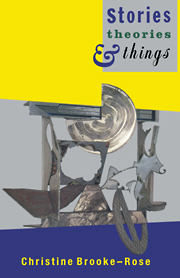Book contents
- Frontmatter
- Contents
- Preface
- Acknowledgements
- Part I Theories as stories
- Part II Stories and style
- 4 A for but: Hawthorne's ‘The Custom-House’
- 5 Ill locutions
- 6 Ill logics of irony
- 7 Ill wit and sick tragedy
- 8 Cheng Ming Chi'I'd
- 9 Notes on the metre of Auden's The Age of Anxiety
- Part III Theories of stories
- Part IV Things?
- References
- Index
6 - Ill logics of irony
Published online by Cambridge University Press: 20 August 2009
- Frontmatter
- Contents
- Preface
- Acknowledgements
- Part I Theories as stories
- Part II Stories and style
- 4 A for but: Hawthorne's ‘The Custom-House’
- 5 Ill locutions
- 6 Ill logics of irony
- 7 Ill wit and sick tragedy
- 8 Cheng Ming Chi'I'd
- 9 Notes on the metre of Auden's The Age of Anxiety
- Part III Theories of stories
- Part IV Things?
- References
- Index
Summary
In the light of the previous chapters on metaphoric thinking and on Represented Thought, I now propose to show how unstable the major concepts in Stephen Crane's The Red Badge of Courage keep turning out to be – how, in fact, they deconstruct themselves as we read, so that the irony, which has been the element most resistant to new modes of understanding this text, is bound to be unstable.
I have found four major oppositions: the hero/the monster, running to/running from, separation/membership, spectator/spectacle. All these deconstruct themselves, but not simply in a series. Intertwined with each other, they are also caught up in another, subsuming opposition, that of courage/cowardice. And the whole of this swallowing act is itself part of a more basic in/out opposition that comes into play throughout the narrative in the outsideness or the insideness of the author, in other words, in irony.
Many critics who have disagreed about Crane's irony take the term for granted, and in two ways: they evaluate it positively, assuming that the author's attitude toward his character is clear; and they do not go into its technique, assuming that if something they do not approve of seems to come from the author it must be ironical. Now the positive evaluation of irony has been questioned since Nietzsche (see Ch. 5, p. 79), and reversed by Bakhtin (1929a), for whom irony is typical of the ‘monological’ novel (as in Tolstoy), where, however complex the viewpoints, the author is always in control and has ‘the last word’ on his characters, as opposed to the ‘dialogical’ (as in Dostoevsky), where the hero is always resisting the control that tries to determine him and which includes irony.
- Type
- Chapter
- Information
- Stories, Theories and Things , pp. 81 - 102Publisher: Cambridge University PressPrint publication year: 1991

